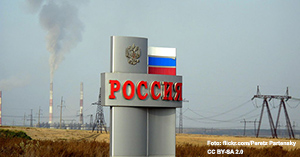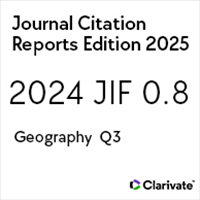La seguridad fronteriza rusa: tendencias en la transformación postsoviética
Russian border security: trends of post-soviet transformation
https://doi.org/10.21670/ref.2313124
Palabras clave:
Rusia, seguridad fronteriza, geopolítica, securitización, aislamientoResumen
Tras la desintegración de la URSS, Rusia enfrentó la tarea de reformar su política de seguridad fronteriza, previamente enfatizada en un estricto control sobre los movimientos transfronterizos de entrada y salida. Desafío agravado aún más por la gestión sin precedentes de 13 mil kilómetros de fronteras recién establecidas con otros estados de la desaparecida Unión Soviética. Se examinan las tendencias evolutivas en la política de seguridad fronteriza de Rusia, la gestión de estas nuevas fronteras, los esfuerzos por integrar los espacios de seguridad fronteriza de Rusia con los de sus aliados postsoviéticos y los impactos del expansionismo geopolítico. La transformación de la política de seguridad fronteriza rusa ha dado resultados mixtos. Por un lado, Rusia ha adoptado eficazmente enfoques modernos para la gestión del flujo transfronterizo. Por otro lado, el alcance de los temas cubiertos por la agenda de seguridad fronteriza de Rusia sigue siendo amplio, abarca temores geopolíticos y otros problemas que no pueden ser gestionados eficazmente por las agencias encargadas de la gestión fronteriza de rutina.Abstract After the disintegration of the USSR, Russia confronted the task of reforming its border security policy, which had previously emphasized stringent control over both inbound and outbound cross-border movements. This challenge was further compounded by the unprecedented management of 13 thousand kilometers of newly established borders with other states of the former Soviet Union. This article examines the evolving trends in Russian border security policy, encompassing the management of these new borders, endeavors to integrate Russia’s border security spaces with those of its post-Soviet allies, and the impacts of geopolitical expansionism. The transformation of Russian border security policy has yielded mixed results. On one hand, Russia has effectively embraced modern approaches to cross-border flow management. On the other hand, the scope of issues covered by Russia’s border security agenda remains extensive, encompassing geopolitical fears and other issued that cannot be managed effectively by the agencies tasked with routine border management.
Citas
Agamben, G. (1998). Homo sacer: sovereign power and bare life. Stanford University Press.
Albert, M. (1998). On boundaries, territory and postmodernity: an international relations perspective. Geopolitics, 3(1), 53-68. https://doi.org/10.1080/14650049808407607 DOI: https://doi.org/10.1080/14650049808407607
Alexseev, M. A. (2003). Economic valuations and interethnic fears: perceptions of Chinese migration in the Russian Far East. Journal of Peace Research, 40(1), 85-102. https://www.jstor.org/stable/3648313 DOI: https://doi.org/10.1177/0022343303040001207
Andreas, P. (2009). Border games: policing the U.S.-Mexico divide. Ithaca.
Añorve Añorve, D. (2010). La transformación del concepto frontera en la transición de la URSS a la Federación Rusa: implicaciones para la supervivencia del Estado. Estudios Fronterizos, 11(22), 9-48. https://doi.org/10.21670/ref.2010.22.a01 DOI: https://doi.org/10.21670/ref.2010.22.a01
Balibar, É. (2002). Politics and the other scene. Verso.
Basaran, T. (2008). Security, law, borders: spaces of exclusion. International Political Sociology, 2(4), 339-354. https://doi.org/10.1111/j.1749-5687.2008.00055.x DOI: https://doi.org/10.1111/j.1749-5687.2008.00055.x
Belnovosti. (2018, November 20). A signal about fortifying the Belarusian-Russian state border was given from Smolensk. https://www.belnovosti.by/politika/iz-smolenska-podali-signal-ob-obustroystve-belorussko-rossiyskoy-gosgranicy
Bigo, D. (2005). Frontier controls in the European Union. Who is in control? Routledge.
Booth, K. (Ed.). (2005). Critical security studies and world politics. Lynne Rienner Publishers. DOI: https://doi.org/10.1515/9781685857356
Buscemi, F., Duquet, N., Golovko, E. & Woods, E. (2018). Illicit firearms proliferation in the EU periphery: the case of Ukraine. In N. Duquet (Ed.), Triggering terror: illicit gun markets and firearms acquisition of terrorist networks in Europe (pp. 461-480). Flemish Peace Institute. https://vlaamsvredesinstituut.eu/wp-content/uploads/2019/07/boek_safte_bw_lowres.pdf
Buzan, B., Waever, O. & de Wilde, J. (1998). Security. A new framework for analysis. Lynne Rienner Publishers. DOI: https://doi.org/10.1515/9781685853808
Caspersen, N. (2012). Unrecognized states. The struggle for sovereignty in the modern international system. Polity.
Charter97. (2017, June 14). Andrei Suzdaltsev: smuggling is the policy of the Belarusian state. https://charter97.org/ru/news/2017/6/14/253179
Dugin, A. (1997). Fundamentals of geopolitics. Arktogeya.
Dyakova, N. & Chepelkin, M. (1995). Russia’s borders in the 19-20 centuries. Institute for us and Canadian Studies.
European Commission. (2002, July 12). eu-Russia partnership on Kaliningrad (Memo 02/169). https://ec.europa.eu›print›MEMO_02_169_EN
Fontanka. (2020, May 1). They may curse us but we are for the Iron Curtain’. Hoteliers of St Petersburg hope for Support from internal tourism. https://www.fontanka.ru/2020/05/01/69238156/?ref=f&fbclid=IwAR2BTkDaopTtt2-BMQfznxTYeH6TtF9quvvjKaQHuqSUl5xpOhaeKsoHY7s
Golunov, S. (2008). Security factor in Russia’s and Kazakhstan’s policies towards their common border [Doctoral dissertation, Nizhny Novgorod State University]. Academia. https://shorturl.at/adqsU
Golunov, S. (2012). EU-Russian border security. Challenges, (mis)perceptions, and responses. Routledge. DOI: https://doi.org/10.4324/9780203106969
Golunov, S. (2017). Shuttle trade across Russia’s borders with the Baltic states and Poland: between tolerance and suppression. East European Politics and Societies, 31(4), 885-908. https://doi.org/10.1177/0888325417725784 DOI: https://doi.org/10.1177/0888325417725784
Golunov, S. & Smirnova, V. (2022). Russian border controls in times of the COVID-19 pandemic: social, political, and economic implications. Problems of Post-Communism, 69(1), 71-82. https://doi.org/10.1080/10758216.2021.1920839 DOI: https://doi.org/10.1080/10758216.2021.1920839
Grishin, M., Gubchenko, V. & Dmitriyev, V. (2001). Problems of national border policy and ways to solve them. BDTs-press.
Haushofer, K. (1927). Grenzen in ihrer geographischen und politischen Bedeutung. Kurt
Vowinckel Verlag.
Herz, J. H. (1957). Rise and demise of the territorial state. World Politics, 9(4), 473-493. https://doi.org/10.2307/2009421 DOI: https://doi.org/10.2307/2009421
Holdich, T. H. (1916). Political frontiers and boundary making. Macmillan and Company.
Karpyuk, I. (2014, December 9). A border with auto barrier. Polit. https://polit.ru/article/2014/12/09/border
Kolossov, V. & O’Loughlin, J. (1998). New borders for new world orders: territorialities at the fin-de-siecle. GeoJournal, 44(3), 259-273. https://www.jstor.org/stable/41147199 DOI: https://doi.org/10.1023/A:1006846322508
Kukhianidze, A., Kupatadze, A. & Gotsiridze, R. (2004). Smuggling through Abkhazia and Tskhinvali Region of Georgia. The Terrorism, Transnational Crime and Corruption Center (TraCCC). https://traccc.schar.gmu.edu/wp-content/uploads/2020/09/Kukhianidze_Kupatadze_Smuggling_Georgia_Eng._2004.pdf
Kulakov, A. (2000). The system of geopolitical factors and its influence on the border policy of Russian Federation [Unpublished doctoral dissertation]. Academy of the Federal Border Guard Service.
Kulikov, V. (2007, June 8). The Border Guard Service of fsb equips itself only with latest technologies. Rossiiskaya gazeta. https://rg.ru/2007/06/08/metr.html
Kulikov, V. (2020, May 31). More than 3.5 million debtors are on the travel ban lists. Rossiyskaya gazeta. https://rg.ru/2020/05/31/v-spiskah-nevyezdnyh-chisliatsia-bolee-35-milliona-dolzhnikov.html
Kulikov, V. (2022, August 3). The Ministry of Justice has accelerated the process of lifting the ban on debtors to travel abroad. Rossiyskaya gazeta. https://rg.ru/2022/08/03/dolgi-pogasiat-avtomatom.html
Lomsadze, G. (2022, September 26). Russian draft dodgers queue at Georgian border. Eurasianet. https://eurasianet.org/russian-draft-dodgers-queue-at-georgian-border
Longo, M. (2017). From sovereignty to Imperium: borders, frontiers and the specter of neo-imperialism. Geopolitics, 22(4), 757-771. https://doi.org/10.1080/14650045.2017.1355785 DOI: https://doi.org/10.1080/14650045.2017.1355785
Marshall, T. (2016). Prisoners of geography. Scribner.
Marx, G. T. (2005). Some conceptual issues in the study of borders and surveillance. In E. Zureik & M. Salter (Eds.), Global surveillance and policing. Borders, security, identity (pp. 11-35). Willan Publishing.
Maynes, C. (2023, April 14). Putin signs a tough new military draft law, banning conscripts from fleeing Russia. NPR. https://www.npr.org/2023/04/13/1169464889/russia-military-draft-ukraine-war
Mead, W. R. (2014, May-June). The return of geopolitics: the revenge of the revisionist powers. Foreign Affairs, 93(3), 69-79. https://www.jstor.org/stable/24483407
Ohmae, K. (1995). The end of the nation state: the rise of regional economies. Free Press.
Paasi, A. (1999). Boundaries as social practice and discourse: the Finnish-Russian border. Regional Studies, 33(7), 669-680. https://doi.org/10.1080/00343409950078701 DOI: https://doi.org/10.1080/00343409950078701
Poryvaeva, O. & Tadtaev, G. (2020, August 4). Clashes involving migrants broke out on the border between Russia and Kazakhstan. RBC. https://www.rbc.ru/society/04/08/2020/5f29859f9a79475a08686e5b
President of Russia. (1996, October 5). Fundamentals of the border policy of the Russian Federation. https://www.consultant.ru/cons/cgi/online.cgi?req=doc&base=EXP&n=240774#bC1wpVTGQ3iMGF2X2 3/6
President of Russia. (2018, April 25). Fundamentals of the border policy of the Russian Federation. https://www.consultant.ru/cons/cgi/online.cgi?req=doc&rnd=LjntGg&base=LAW&n=296788&dst=100009&fi eld=134#whwWxVTMFRWpauqX1 5/12
Putin listed the consequences of a possible Ukraine’s accession to the NATO. (2021, December 8). Izvestia. https://iz.ru/1261522/2021-12-08/putin-nazval-posledstviia-vozmnozhnogo-vstupleniia-ukrainy-v-nato
Raspopova, A. (2020, May 22). Hiding in trucks, paying fraudsters. What is happening on the border with Belarus. Autonews. https://www.autonews.ru/news/5ec4fd9d9a79470a9b18f5be
RIA Novosti. (2009, February 12). Up to 40% of drugs from Asia are detained at the border between Russia and Kazakhstan. Nomad. https://nomad.su/?a=13-200902130210
Rogozin, D. (2003). We will take back Russia. Porog.
Russian Life. (2023, May 24). FSB to seize passports. https://russianlife.com/the-russia-file/fsb-to-seize-passports
Sasunkevich, O. (2015). Informal trade, gender and the border experience: from political borders to social boundaries. Ashgate. DOI: https://doi.org/10.4324/9781315588506
Sokolov-Mitrich, D. (2001, July 11). The incognito border.
Sputnik Tajikistan. (2022, August 13). Ministry of Internal Affairs reported a record low number of bans to enter the Russian Federation for migrants. https://tj.sputniknews.ru/20220813/mvd-zapret-russia-1050689776.html
TASS. (2014, December 8). Belarus reopened customs posts on the border with Russia. https://tass.ru/ekonomika/1631447
TKS. (2008, January 28). Last year, the number of criminal cases initiated by officers of the Siberian Operational Customs increased by 4.5 times. https://www.tks.ru/news/yandex/2008/01/28/0010
Toal, G. (2017). Near abroad. Putin, the West, and the contest over Ukraine and the Caucasus. Oxford University Press. DOI: https://doi.org/10.1093/oso/9780190253301.001.0001
Tymko, A. (1996). Two borders doctrine. Nezavisimoe voennoe obozrenie 35.
Vares, P. (1999). A torny way to security. In P. Vares (Ed.), Estonia and the European Union: in search of security (pp. 27-38). Institute of International and Social Studies EuroUniversity.
Vaughan-Williams, N. (2009). Border politics: The limits of sovereign power. Edinburgh University Press. DOI: https://doi.org/10.1515/9780748640218
Yussin, M. (1995, January 31). Customs checkpoints to be kept in spite of the customs union agreement concluded by the three states. Izvestia.
































